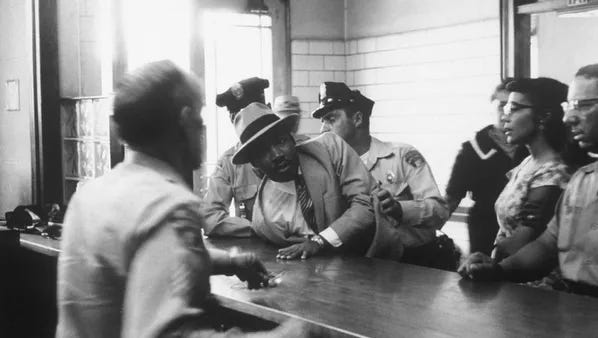"Injustice anywhere is a threat to justice everywhere. We are caught in an inescapable network of mutuality, tied in a single garment of destiny. Whatever affects one directly, affects all indirectly." - Dr. Martin Luther King Jr. From his April 1963 "Letter from a Birmingham Jail."

This week's Torah portion, Shemot, which begins the book of Exodus, introduces us to the story of the Israelites' journey from slavery to freedom and redemption. The Israelites lived in Egypt as enslaved people and faced difficult circumstances. However, the redemption process does not begin with Divine intervention but with the act of non-violent civil disobedience by the midwives Shifrah and Puah. Pharaoh ordered the midwives to kill the male Israelite babies as they were born, but Shifrah and Puah refused to comply with this order, and instead, they saved the lives of these children. This act of defiance sets in motion a chain of events that ultimately leads to the Israelites' freedom.
The midwives Shifrah and Puah serve as an important example of the power of resistance and the importance of standing up for what is right, even in the face of seemingly insurmountable odds. Their act of non-violent civil disobedience inspires others to follow in their footsteps and fight for their rights. Through the actions of individuals like Shifrah and Puah, we learn change and progress are possible.
As many synagogues across the United States celebrate the life and legacy of Dr. Martin Luther King Jr. this week, it is essential to reflect on how his message and teachings align with the themes in the Torah portion of Shemot. The Civil Rights movement, led by Dr. King, was rooted in the belief in non-violent resistance, a principle that mirrors the actions of the midwives Shifrah and Puah. Both Dr. King and the midwives recognized the power of standing up against injustice through peaceful means. Dr. King and the Civil Rights activists fought tirelessly for the rights and dignity of marginalized communities, facing discrimination and oppression head-on. They sacrificed their safety and even their lives in pursuit of equality for all. The legacy of Dr. King and the Civil Rights movement is a powerful reminder of the importance of peaceful resistance in creating a more just and equitable society.
In addition to reflecting on the themes of slavery, freedom, and redemption in Shemot, we can also consider how these themes are relevant to the current situation in the United States. The country has a long history of racism, bigotry, and discrimination, and there is a need for reflection and repentance, or teshuvah, to move toward redemption. This process of teshuvah involves acknowledging and taking responsibility for past and current wrongdoings, actively working towards making amends, taking responsibility and actively working towards creating a more just and equitable society, as well as repairing the harm caused to marginalized groups.
As a society, it is important that we recognize and confront our own biases and prejudices and work towards creating a more inclusive and equitable society. This involves acknowledging the ways in which systems of power and privilege have continued to oppress marginalized groups, such as the unjust treatment of Black people, immigrants, and indigenous communities. It also means actively taking steps to dismantle these systems and create a more just and fair society, for example, by advocating for policies that promote equal opportunities and addressing the root causes of discrimination. It also involves engaging in acts of non-violent civil disobedience and resistance when necessary in order to bring about positive change.
The legacy of Dr. King serves as a reminder of the importance of this work and the power of non-violent resistance in creating a more compassionate and just society. His teachings and message continue to inspire and guide us in our efforts to create a better world for all.
The name of God in this week's Torah portion, Ehyeh-Asher-Ehyeh, means "I am That I am" or "I Will Be What I Will Be." This phrase captures the essence of who God is - the Mystery, the Divine, and whatever we discover God to be. The Torah wants us to know that whoever we are at this moment, we are awesome, and if we use all of the talents God gave us, we will reach our own personal and beautiful potential. We will be what we will be, maybe even the Moses of our generation. Let us take inspiration from the Torah and Martin Luther King Jr.'s legacy as we strive for a more compassionate and equitable society. We can make a difference if we use the talents God gave us and stand up for what is right in the face of injustice.
Shemot and The Ordinary Burning Bush
Note: If you are not already a member of this newsletter, please consider subscribing. I always appreciate you sharing my content with others and leaving your thoughts in the comments.




Your storytelling and ways of interpreting Biblical moments is beautiful, and your links to current life in our troubled, but beautiful world, simply exquisite.